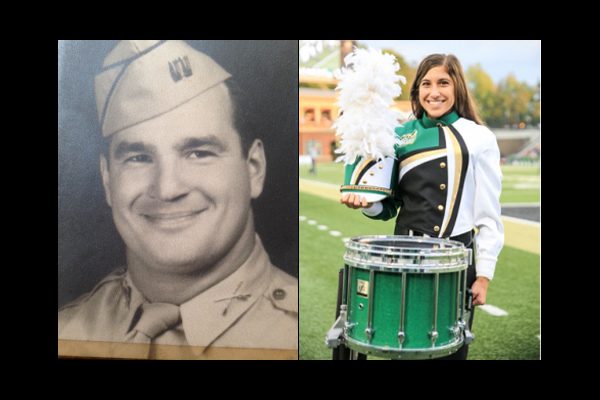Edward Horvath

“He was awarded one Silver Star, one Bronze Star, European-African-Middle Eastern Campaign Medals with three Bronze Stars Combat Infantryman badges. His leadership, his kindness, and his resolve to bring out the best in his men gained their utmost respect and admiration.
Edward Horvath’s great-granddaughter, Raven Pfeiffer, will be wearing his sash during the ‘Pride of Niner Nation’ Marching Band trip to France. He would be so proud.”
– Jeanne Pfeiffer, daughter of Edward Horvath and grandmother of Raven Pfeiffer, student
Edward Horvath, remembered by his daughter, Jeanne Pfeiffer
One of the “Iron Men of Metz,” Edward Horvath was a respected infantry officer.
Capt. Edward G. Horvath, a graduate of Bowling Green State University, was inducted into the Army on June 20, 1942, in Toledo, Ohio; he served until Nov. 22, 1945.
Horvath was assigned to the U.S. Army’s 95th Infantry Division, which was responsible for liberating much of France. The 95th became known as the “Iron Men of Metz” for their resolve in battling both the Germans as well as enduring more than 14 days of intolerable weather conditions of rain, floods and bitter cold in eastern France. Under the command of General George S. Patton, the 95th Division included Company F, 377th Infantry Regiment (Horvath’s Horrible Foxes) that liberated Metz, France, from four years of brutal Nazi occupation.
During his tour in Europe, Capt. Horvath was a rifle platoon leader, a rifle commanding officer and a regimental scout in combat. He was a brave and inspiring leader who helped save many lives. He received one of his Bronze Stars for heroic achievement in the Metz battle.
When his platoon engaged in clearing high ground east of Oberlimberg, Germany, and was pinned down by intense machine gun fire, Horvath, a first lieutenant at the time, rallied his men and moved up to reorganize the platoon crossing minefields to lead a striking assault on German positions. Returning to Oberlimberg, his platoon came under heavy mortar fire and severe casualties were sustained. With no regard for his own safety, he carried many of the wounded from the field under fire and supervised the evacuation of all other casualties and administered first aid until company aid men arrived.